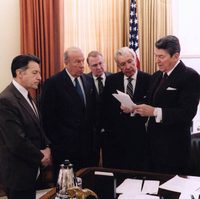At this week's Organization for Security and Cooperation in Europe summit in Astana, Kazakhstan, U.S. Secretary of State Hillary Clinton declared that the unauthorized release of U.S. diplomatic documents by the Wikileaks organization "will not in any way interfere with American diplomacy or our commitment to continuing important work that is ongoing."
Clinton is correct: The vital work of international affairs will continue. Diplomacy will not grind to a halt because of the leaks, most of which fall under the category of what Paul Pillar describes as "titillation." But although the embarrassment will fade away with time, will things then return to business as usual? In other words, will foreign governments, having been graphically reminded yet again that Washington finds it difficult to keep secrets, change their approach to communicating with the United States?
The question brings to mind a vignette from Bob Woodward's book, "Veil," about former CIA Director William Casey's tenure at Langley during the Reagan administration. Woodward describes how Prince Bandar bin Sultan, at the time the Saudi ambassador to Washington, concealed the Saudi role in sending aid to the contras. The prince was was well-aware that the National Security Agency could intercept and decode his cable communications with Riyadh -- thereby exposing his activities. So, Woodward says, Bandar relied on personal couriers to brief King Fahd and other members of the Saudi government, and carried their letters in response directly to the President Ronald Reagan and other senior U.S. officials.

